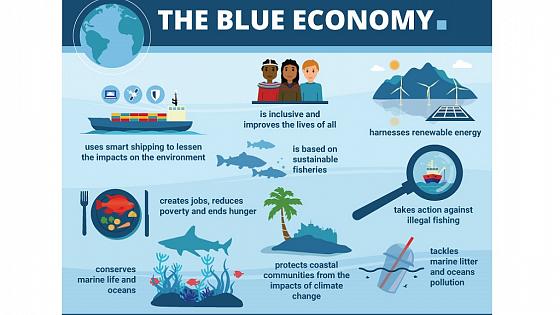By Okai Abuwinne Anthony
The Blue Economy concept has gained prominence in the last decade. This can be attributed to the depleting resources of countries especially oil and gas and other solid minerals and the concomitant need for nations to diversify their economies so as to increase revenues in order to meet the social needs of their people. Another major reason why the Blue Economy concept has become very important is the need to safeguard the earth through the sustainable exploitation of marine resources for the benefit of generations unborn.
The Blue Economy concept is the sustainable exploitation of all resources in the marine environment including but not limited to fisheries, hydrocarbons, aquatic life, maritime transport, tourism, ports and harbour development and maintenance.
The Blue Economy concept also seeks to engender the realization of a number of the Sustainable Development Goals (SDGs) especially the SDG 14 which speaks to life under water. SDG 14 notes that “Pollution (plastic and runoff), overfishing, coral bleaching, and coastal ecosystem destruction are all exacerbated by population growth. Two-thirds of marine areas have been damaged by human activity and a third of sharks and rays and a third of reef corals are threatened with extinction. Tackling the loss of life under water has to include a commitment to reducing population growth and runaway consumption. Family planning, women’s education and empowerment together can also enable more women to participate in marine resources management; enhance food security and mitigate the impacts of climate change”.
Since the Rio Earth Summit 2012, the global community has started to recognize the importance of marine environment which if sustainably managed, has huge potential for boosting socio- economic development through business opportunities and job creation.
Recognizing the strategic importance of the blue economy towards reducing poverty and inequality in Nigeria, the Vice President, Professor Yemi Osinbajo had on January 17, 2022 launched the Expanded Committee on Sustainable Blue Economy in Nigeria (ECSBEN) with the mandate to recommend ways of strengthening the governance framework and infrastructural development of the maritime industry. The Committee had members drawn from Rivers, Lagos, Delta, Akwa Ibom, Borno, Ogun, Ondo, Cross River, Bayelsa, and Edo states. Others are the Nigerian Maritime Administration and Safety Agency (NIMASA), Nigerian Ports Authority (NPA), Maritime Academy of Nigeria (MAN) Oron and the Chief of the Naval Staff. The Ministers of Foreign Affairs, Power, Finance, Environment, Trade and Investment, Agriculture and Water Resources and representatives of the Lake Chad Basin Commission and Nigeria Economic Summit Group are also members.
The membership of this committee highlights the strategic importance of the blue economy to Nigeria especially at a time of dwindling revenues necessitating an urgent need for economic diversification.
Highlighting the strategic importance of the Blue economy, the Executive Secretary of Nigerian Shippers Council, Hon. Emmanuel Jime in a presentation titled “The Blue Economy and African Economic Integration” opined that African Blue Economy is made up of vast lakes and rivers and extensive ocean resource base. Thirty-eight (38) of the Fifty-four (54) African States are coastal states. More than 90% of Africa’s imports and exports are conducted by sea and some of the most strategic gateways for international trade are in Africa. This therefore underscores the geographical importance of Africa in global shipping. Africa’s aquatic and marine space has remained largely under exploited but now being recognized for their potential contribution to inclusive and sustainable development. The Blue World is more than an economic space, it is a part of Africa’s rich geographical, social and cultural canvas. If fully exploited, Africa’s Blue economy can constitute a major source of wealth and will considerably catapult the continent’s fortune”.
The implication of the Blue Economy for Nigeria and the region cannot be overemphasized as opined by Ojijo Odiambo and Abubakar Metcho in their Policy Brief produced by the Strategic Policy Advisory Unit of the UNDP Nigeria Country Office. They stated that the country occupies some 853km (a paltry 2 percent) but nonetheless strategic portion of the estimated 47,000 Km of Africa’s coastline. Beyond its geo-strategic importance, Nigeria’s coastline also comprises majorly of the oil and biodiversity- rich Niger Delta which covers 80 percent of the coastline. Indeed, Nigeria’s coastal and marine eco-system are rich in flora and fauna including fish, forests, aqua plants, coral reefs, and aquabirds which make up 60 percent of birds in the country.
The coastline, in addition to being to a number of off- shore mines, also plays an important role in facilitating international trade, job creation and ultimately economic growth and poverty reduction.
It is important to mention that Nigeria shares some of these blue economy resources with her immediate neighbours and others in the Gulf of Guinea. Given the scenario, both at the national and extra- territorial levels, there are inherent trade- offs and possible negative externalities associated with harnessing blue economic resources, implying regional cooperation will be key to the realization of benefits and long- term sustainability. Sustainable fisheries, aqua culture, tourism, transportation and maritime and port development could help spur job creation, economic growth, poverty reduction, improved food and energy security while enhancing ocean health and sustainable use of ocean and marine resources.
Furthermore, efforts have been made by some Africa countries in the development of the Blue Economy, however, a lot remains to be done in fully harnessing the Blue Economy. In 2014, Africa Union endorsed the Africa Integrated Maritime Strategy (AIMS) 2050 which is being championed by Seychelles, South Africa and Mauritius. As part of the implementation process, in 2014 South Africa launched operation “Phakisa” focusing on maritime transport, manufacturing, aquaculture and marine protection which will create 1 million jobs and add $177 billion to the GDP by 2033. Mauritius hopes to substantially increase aquaculture production and jobs in shipping industries adding 11 percent to the GDP while Seychelles completed an innovative debt-for- nature conservation and raised funding to buy $21 million of sovereign debt in 2016. He further stated that in line with the regional initiatives, several African countries, including Ghana, Kenya and Nigeria are at various stages of developing national coordination framework and strategies for the government through the Aquaculture for food and jobs programme. In the sub-region, the World Bank-funded West African Regional Fisheries program aims to increase the economic contribution of marine resources through strengthened fisheries governance, reduced illegal fishing and increased value addition to fish products.
In Nigeria, it is expected that the Expanded Committee on Sustainable Blue Economy headed by the Vice President would come up with a draft of national Action Plan that will guide the implementation while also seeking funding mechanisms to realize the idea of the Nigeria Blue Economy.
Concerted efforts must be made to enforce the new policy document and indeed other policies that seek to enhance the sustainable exploitation of marine resources. Relevant agencies must step up the enforcement of Illegal, Unregulated and Unreported (IUU) fishing for instance as to avoid indiscriminate fishing often using hazardous chemicals. The Federal Ministry of Transportation and NIMASA must build on the gains of the Deep Blue Project to sustain the enforcement of security in the maritime environment as security is critical to any meaningful development.
Relevant agencies must seek the involvement of local communities to promote and sustain natural ecosystems as pollution, dumping of toxic waste and plastics has become a menace in the country.
The potentials of the blue economy are legion but to actualize them, clear strategies should be developed, a sustained commitment and political will to implementing the strategies must be emplaced while appropriate sanctions must be developed and applied as accordingly.






